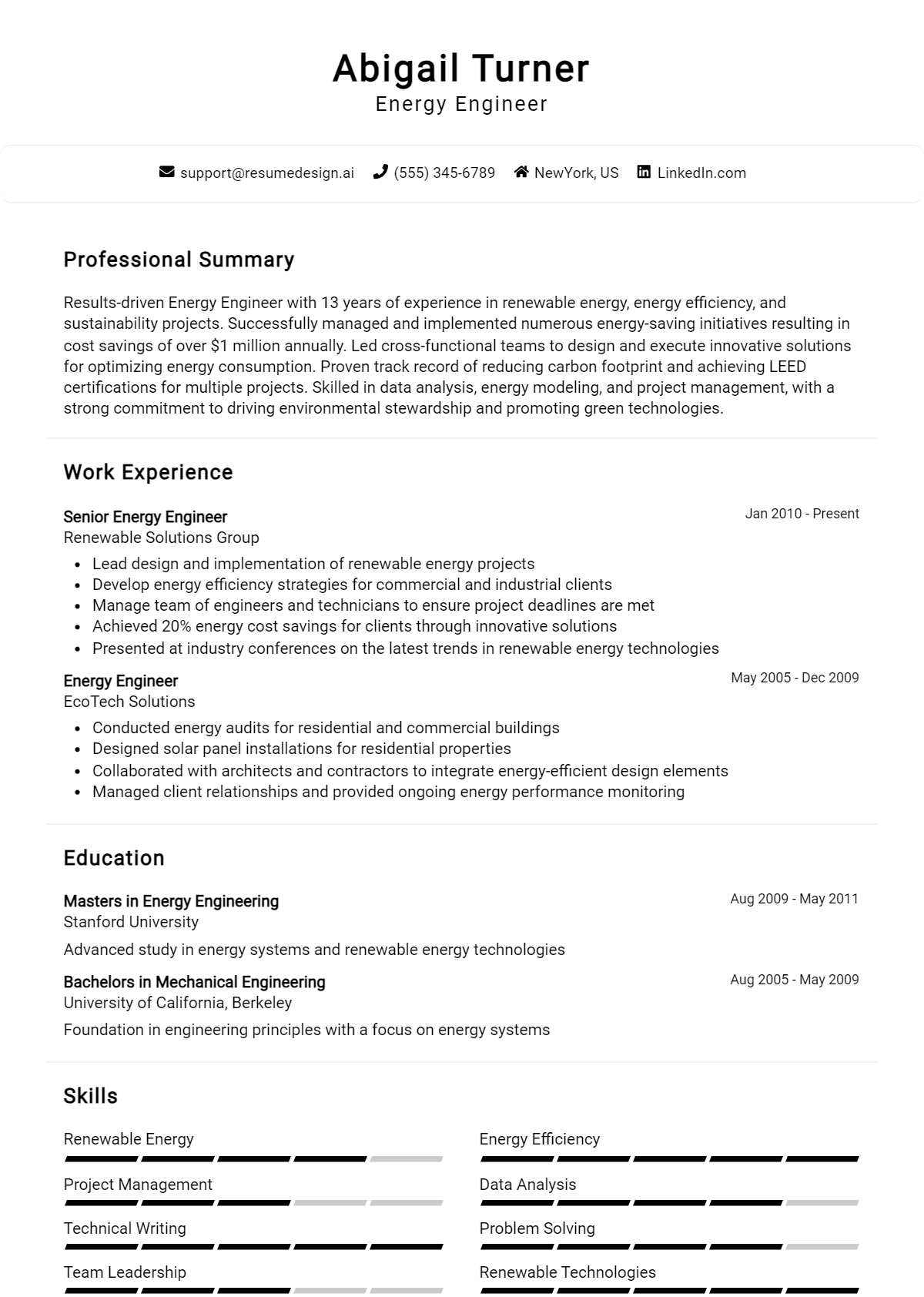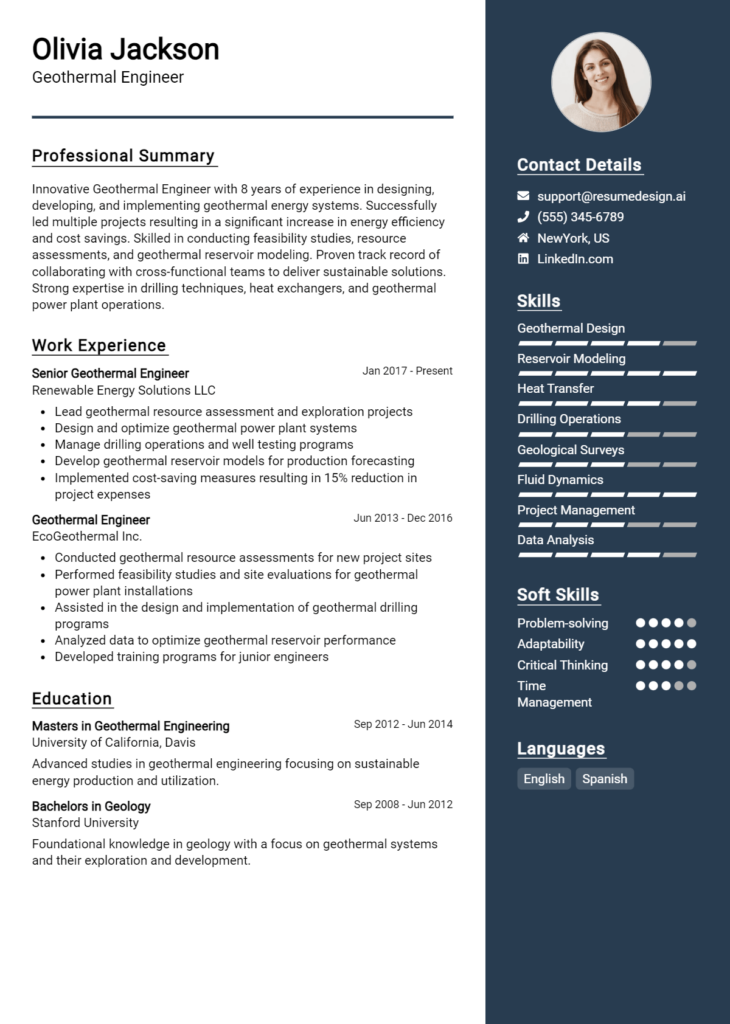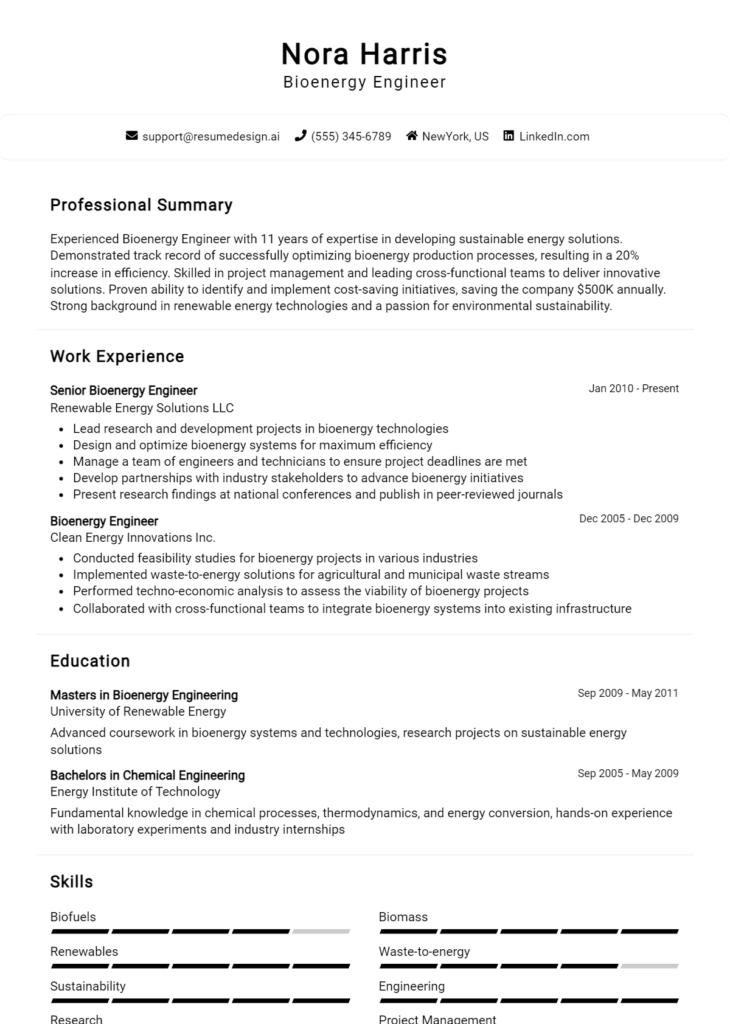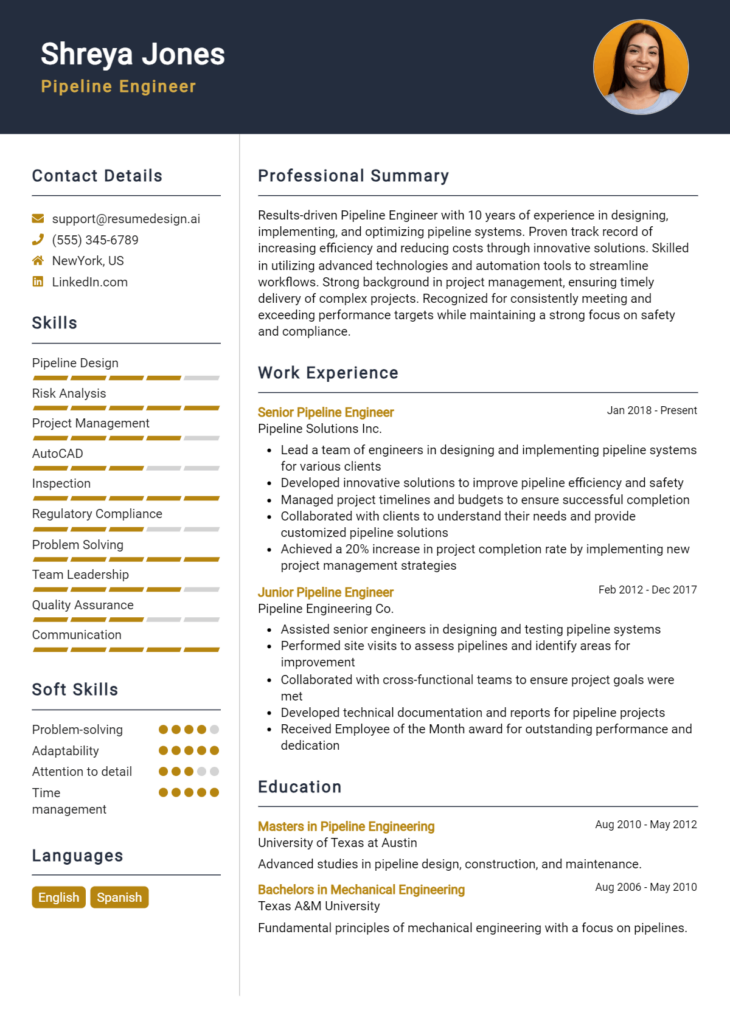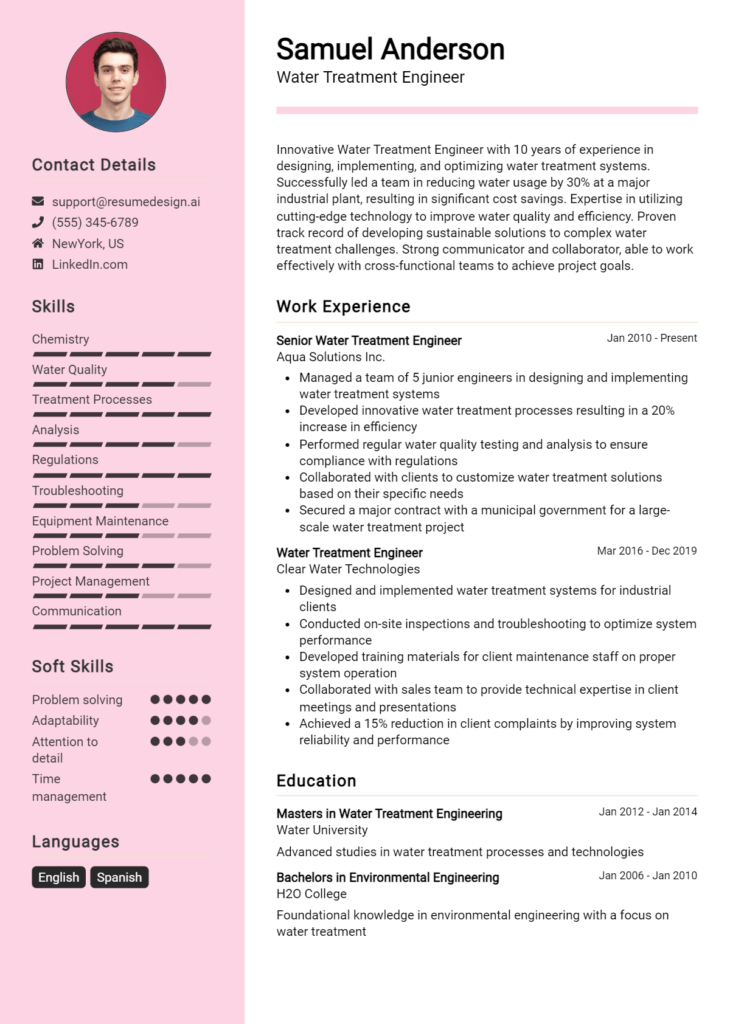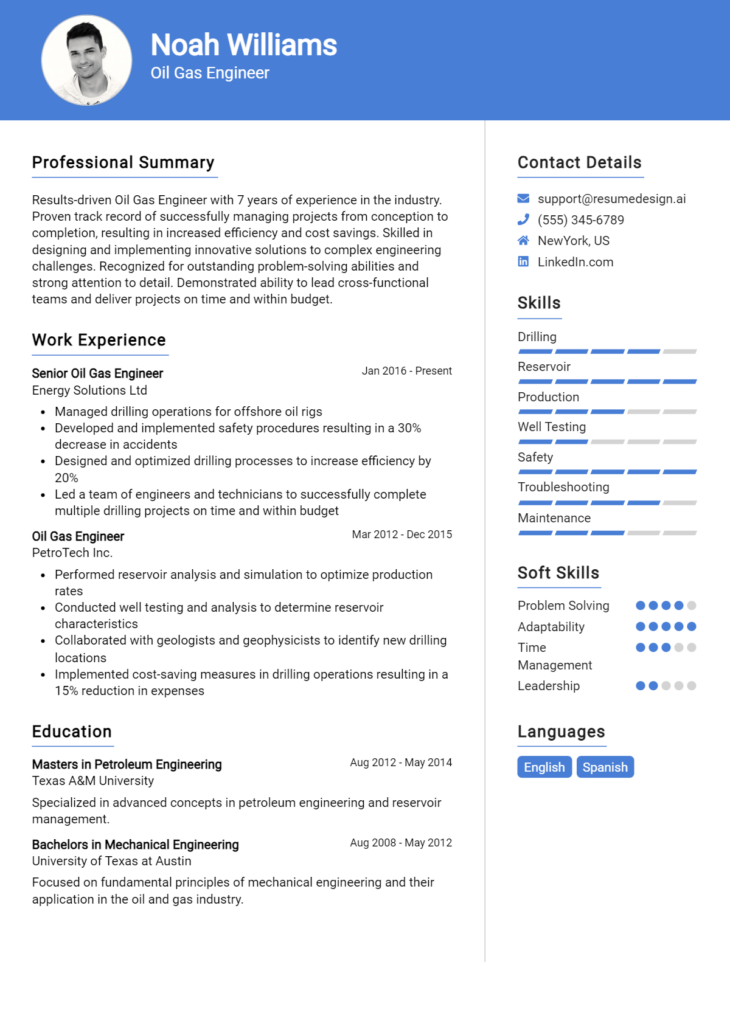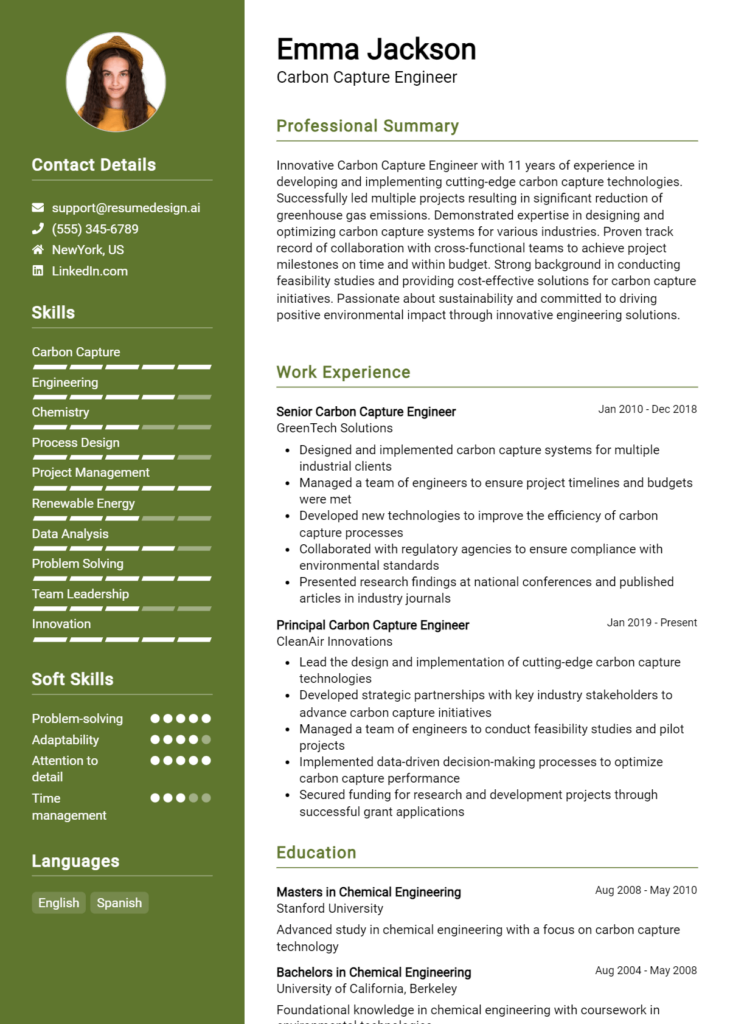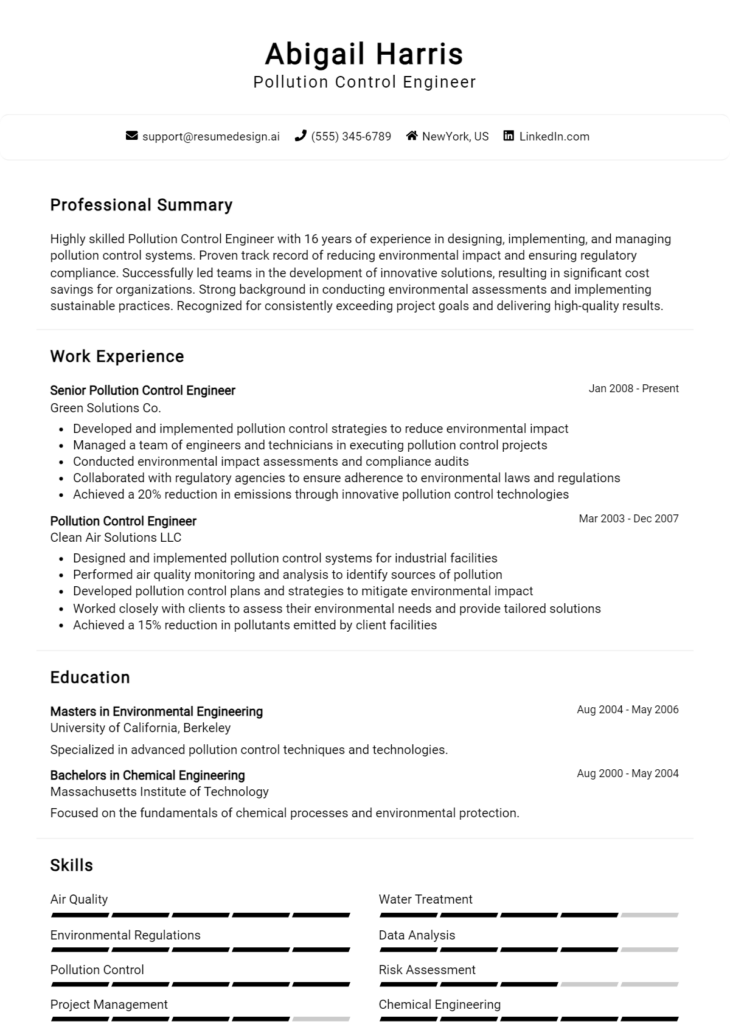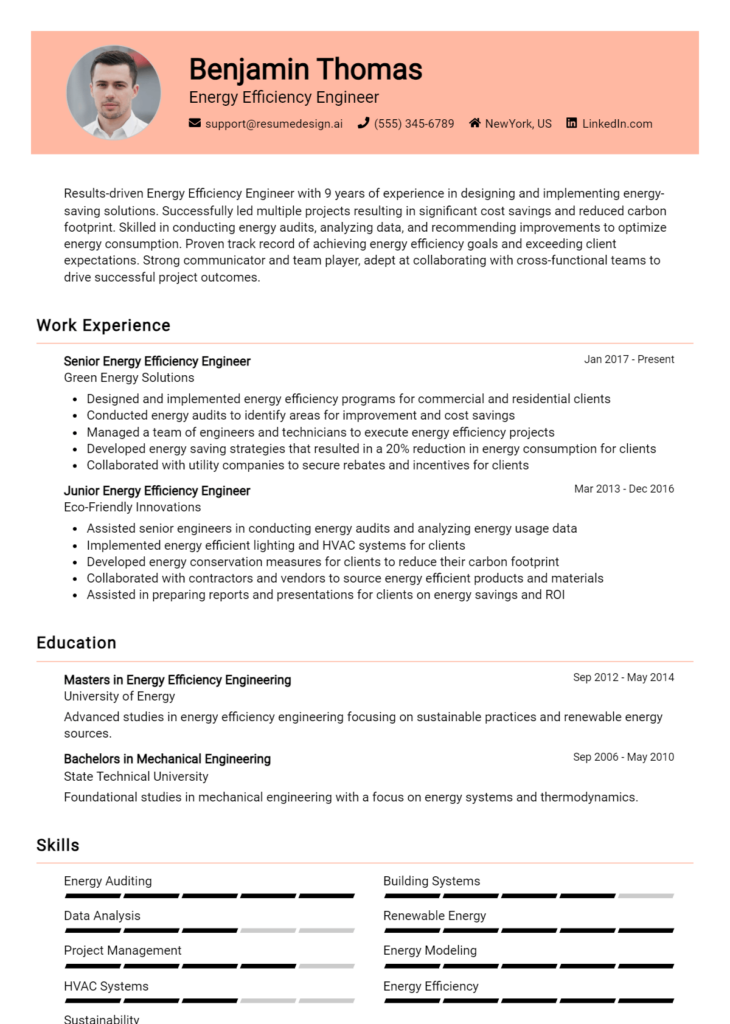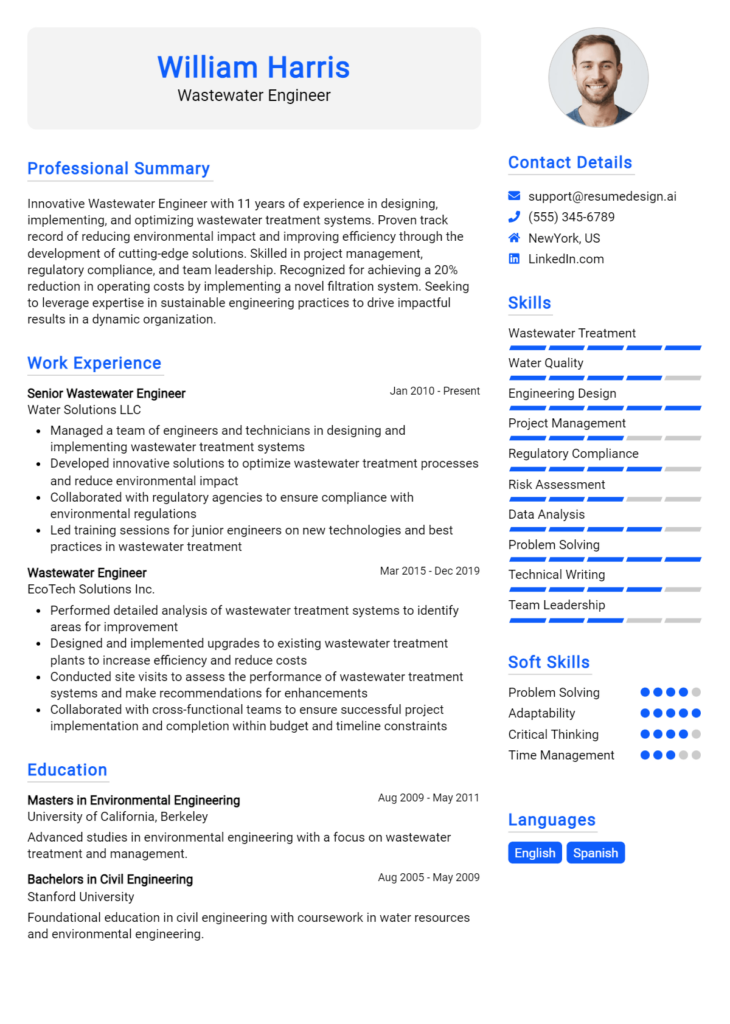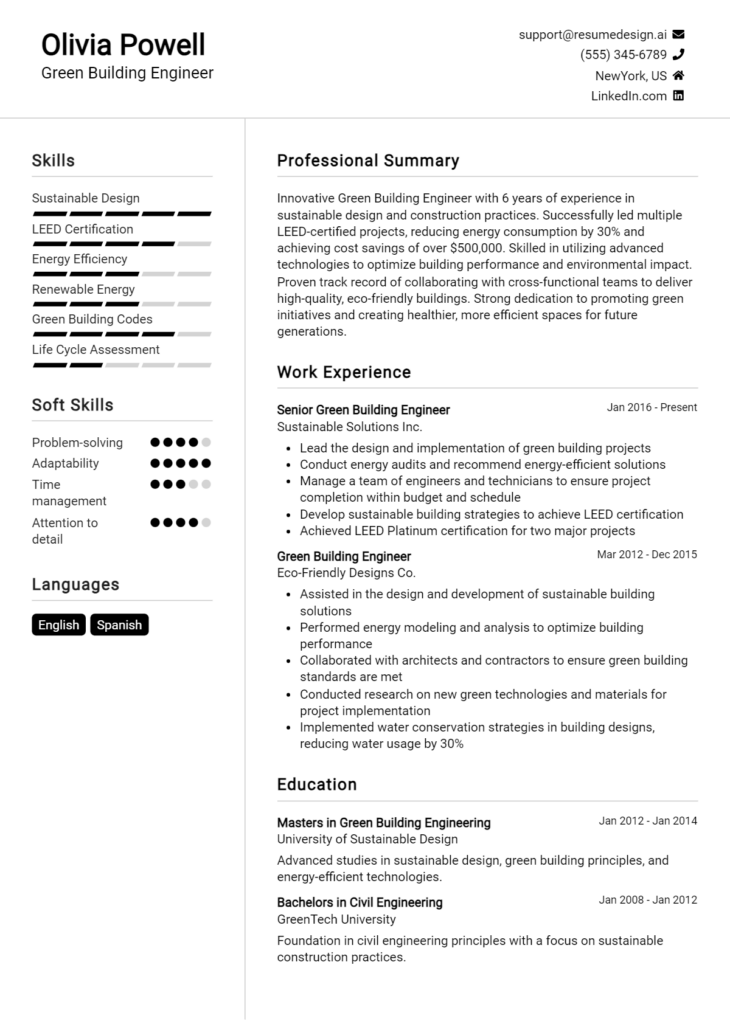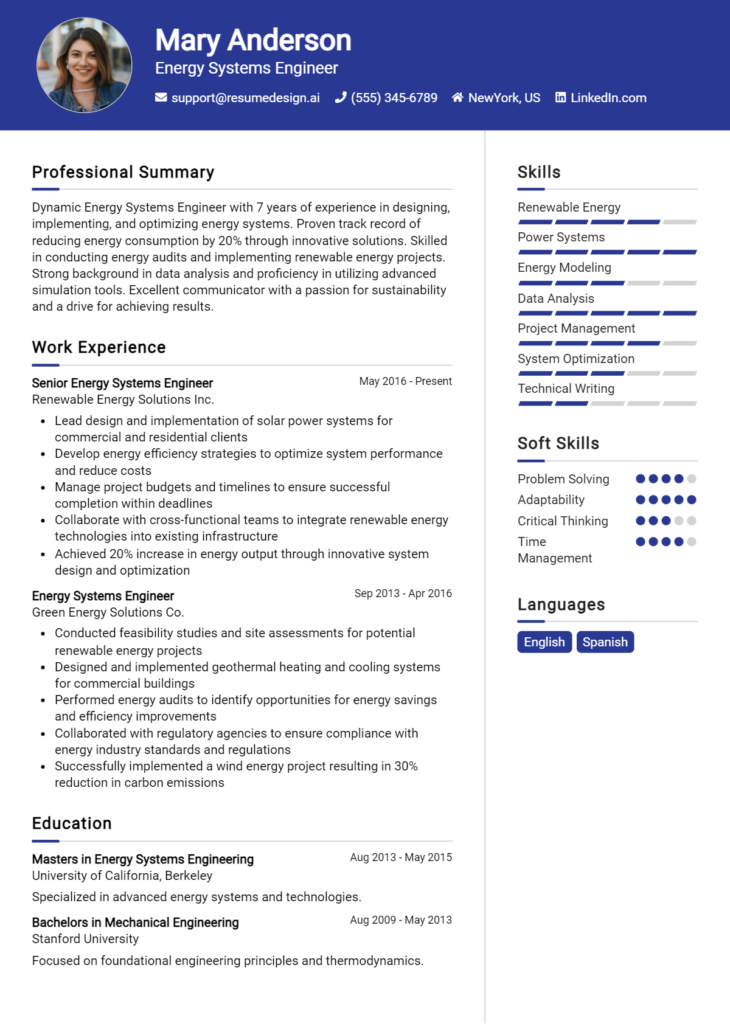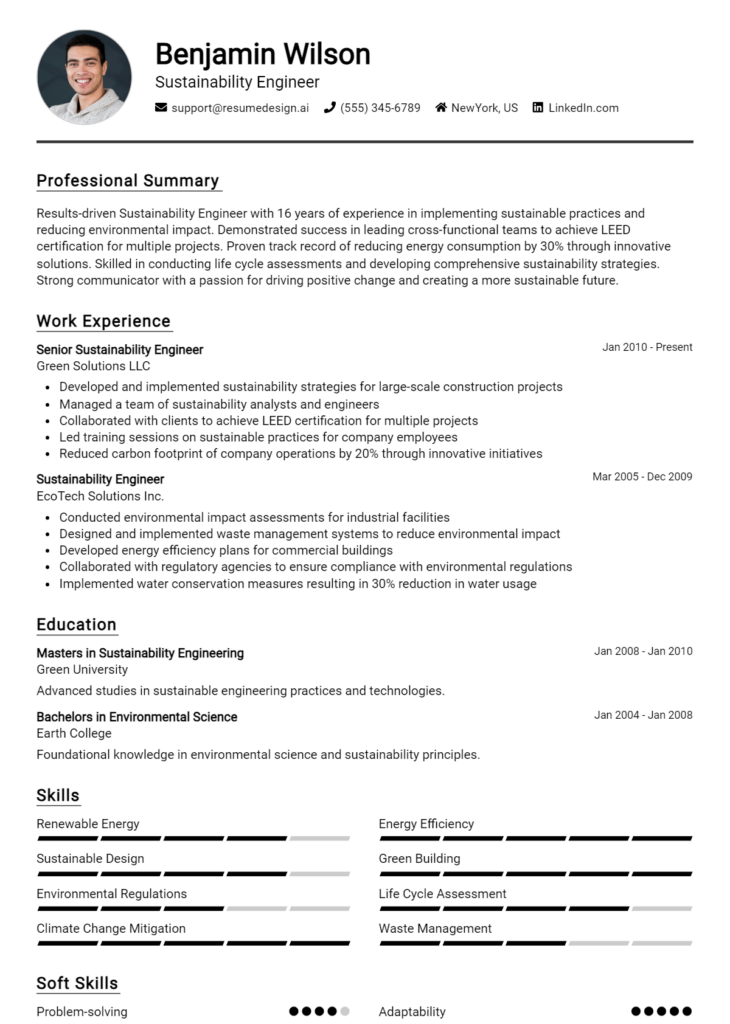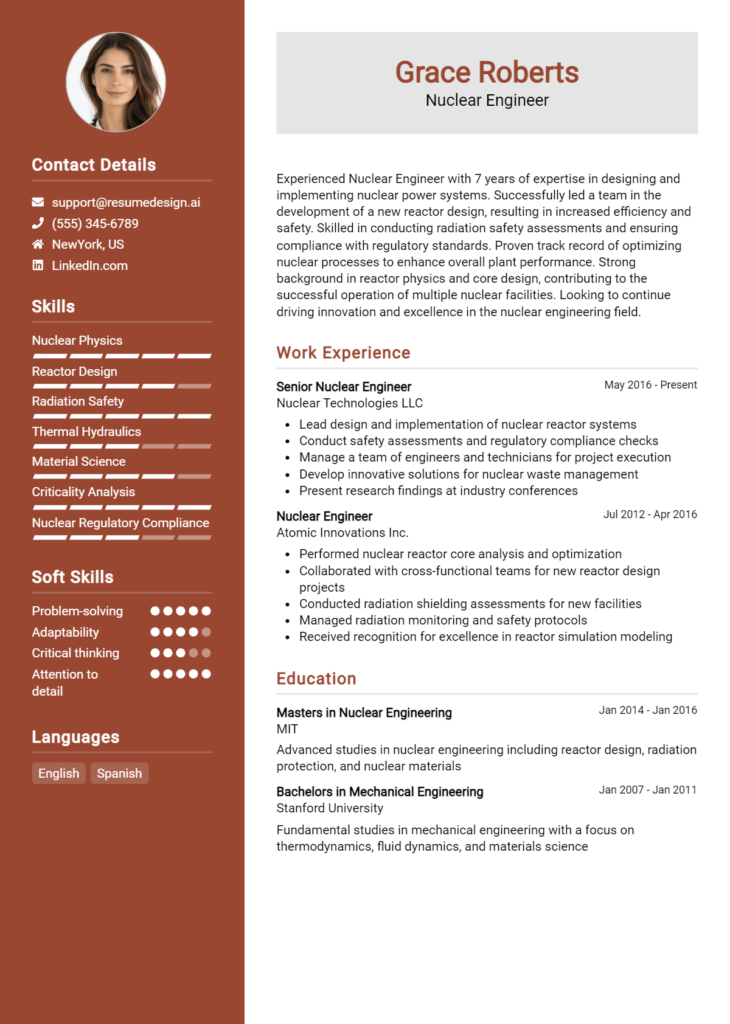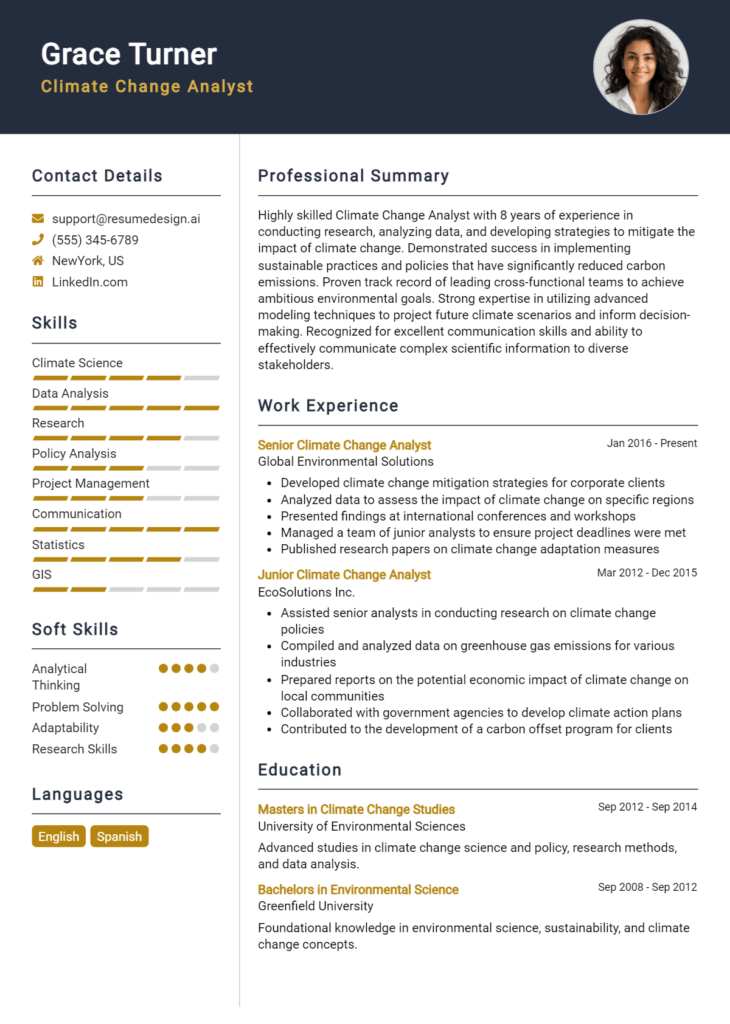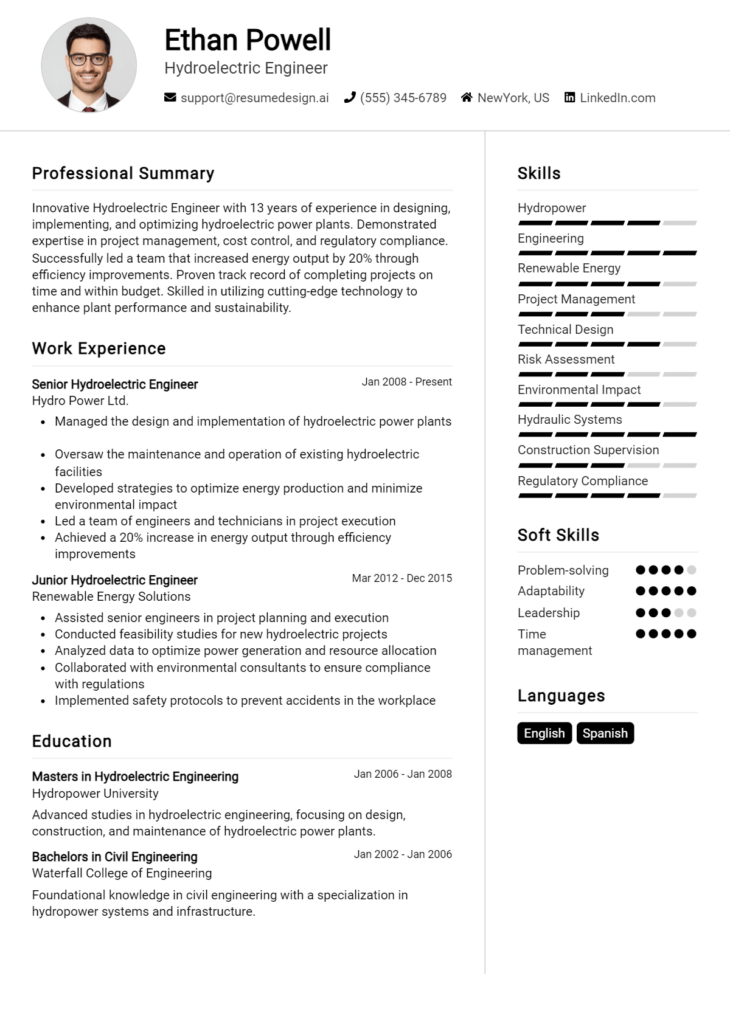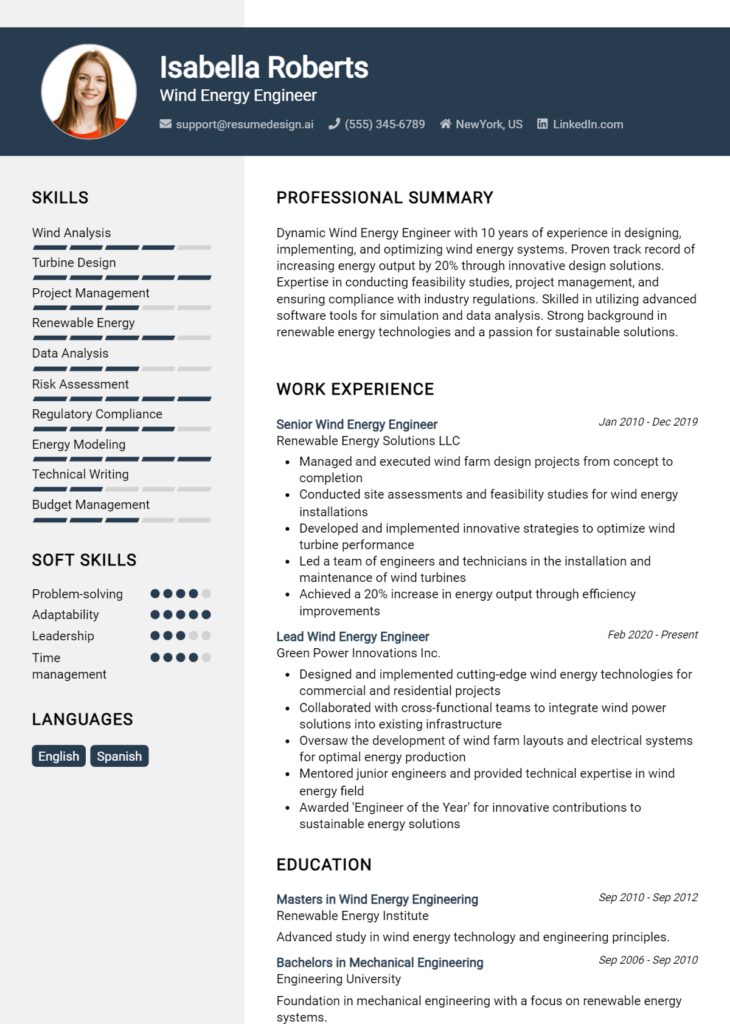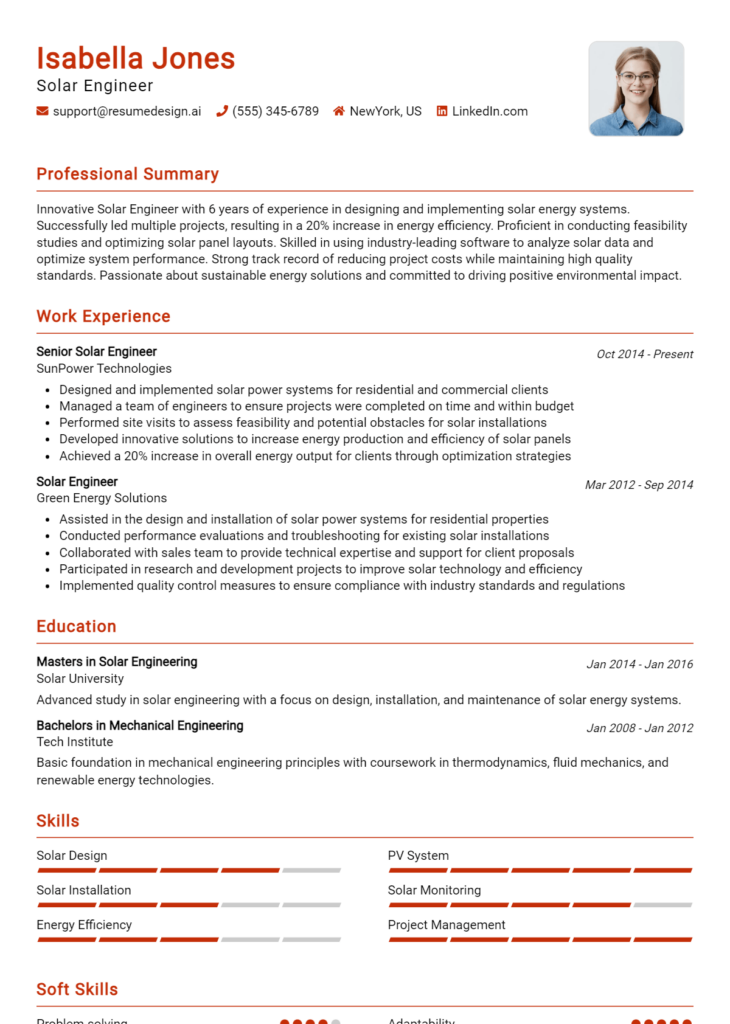Energy Engineer Core Responsibilities
An Energy Engineer plays a crucial role in enhancing energy efficiency and sustainability within an organization. Key responsibilities include conducting energy audits, designing energy management systems, and collaborating across departments such as operations, finance, and environmental compliance. Essential skills include technical expertise in energy systems, operational acumen, and strong problem-solving abilities. These competencies are vital in meeting organizational goals, and a well-structured resume can effectively showcase these qualifications, enhancing career prospects.
Common Responsibilities Listed on Energy Engineer Resume
- Conducting comprehensive energy audits and assessments.
- Designing and implementing energy management strategies.
- Analyzing energy consumption data to identify efficiency opportunities.
- Collaborating with cross-functional teams to optimize energy use.
- Monitoring and reporting on energy performance metrics.
- Researching and recommending renewable energy solutions.
- Developing and managing energy projects from conception to completion.
- Staying updated on energy regulations and incentives.
- Providing training and support on energy-saving initiatives.
- Creating technical reports and presentations for stakeholders.
- Conducting feasibility studies for energy efficiency technologies.
- Implementing energy conservation measures and practices.
High-Level Resume Tips for Energy Engineer Professionals
In today's competitive job market, a well-crafted resume is essential for Energy Engineer professionals seeking to make a strong first impression on potential employers. Your resume serves not only as a summary of your professional journey but also as a reflection of your skills, achievements, and commitment to the field of energy engineering. A compelling resume can set you apart from other candidates, showcasing your unique qualifications and demonstrating your value to prospective employers. This guide will provide practical and actionable resume tips specifically tailored for Energy Engineer professionals, helping you to effectively communicate your strengths and experiences.
Top Resume Tips for Energy Engineer Professionals
- Tailor your resume to match the job description by incorporating relevant keywords and phrases.
- Highlight your technical skills, such as proficiency in energy modeling software, renewable energy technologies, and energy efficiency assessments.
- Showcase your relevant experience in energy projects, including internships, co-ops, and previous employment.
- Quantify your achievements by using metrics to demonstrate the impact of your work, such as energy savings or project cost reductions.
- Include certifications and licenses that are pertinent to the energy industry, such as LEED accreditation or Certified Energy Manager (CEM).
- Utilize a clean and professional format that enhances readability and emphasizes key information.
- Incorporate a summary statement at the top of your resume that succinctly captures your qualifications and career goals.
- List any relevant professional associations or memberships that demonstrate your engagement with the energy sector.
- Keep your resume concise, ideally one page, focusing on the most relevant information that aligns with the job you are applying for.
By implementing these tips into your resume, you can significantly increase your chances of landing a job in the Energy Engineer field. A tailored and well-structured resume not only highlights your qualifications but also conveys your dedication to the energy sector, making you a more attractive candidate to potential employers.
Why Resume Headlines & Titles are Important for Energy Engineer
In the competitive field of energy engineering, a well-crafted resume headline or title serves as a critical first impression for hiring managers. A strong headline can immediately capture attention and encapsulate a candidate's key qualifications in a succinct and impactful phrase. It acts as a powerful summary that highlights relevant skills and experience, making it easier for recruiters to assess a candidate's suitability for the role. A concise, relevant, and job-specific headline not only sets the tone for the rest of the resume but also encourages further reading by showcasing the candidate's unique value proposition.
Best Practices for Crafting Resume Headlines for Energy Engineer
- Keep it concise; aim for one impactful phrase.
- Use industry-specific terminology to demonstrate expertise.
- Highlight key qualifications or skills relevant to the energy engineering field.
- Tailor the headline to match the specific job description.
- Incorporate measurable achievements or results when possible.
- Avoid jargon that may confuse hiring managers outside of the field.
- Use active language to convey confidence and proactivity.
- Make it compelling to stand out from other candidates.
Example Resume Headlines for Energy Engineer
Strong Resume Headlines
Innovative Energy Engineer Specializing in Renewable Energy Solutions and Efficiency Optimization
Results-Driven Energy Engineer with 5+ Years of Experience in Sustainable Design and Energy Auditing
Experienced Energy Engineer Focused on Reducing Operational Costs Through Advanced Energy Management Strategies
Weak Resume Headlines
Energy Engineer Seeking Job
Qualified Professional in Energy
Engineer with Some Experience in Energy
The strong headlines are effective because they are specific, highlighting the candidate's expertise and unique contributions to the field of energy engineering. They convey a clear message about the candidate's strengths and align closely with the job requirements. In contrast, the weak headlines fail to impress due to their vagueness and lack of detail, making it difficult for hiring managers to discern the candidate's qualifications or potential value to the organization. By avoiding generic phrases and focusing on specific achievements and skills, candidates can make a memorable impression right from the start.
Writing an Exceptional Energy Engineer Resume Summary
A resume summary is a crucial component for Energy Engineers looking to stand out in a competitive job market. This brief section at the top of the resume serves as a powerful introduction, quickly capturing the attention of hiring managers by highlighting key skills, relevant experience, and notable accomplishments that align with the job role. A strong resume summary is concise and impactful, tailored specifically to the job being applied for, ensuring that it resonates with the employer’s needs and expectations.
Best Practices for Writing a Energy Engineer Resume Summary
- Quantify Achievements: Use numbers and metrics to demonstrate your impact, such as energy savings or project budgets managed.
- Focus on Relevant Skills: Highlight specific technical skills and certifications pertinent to the energy engineering field.
- Tailor the Summary: Customize your summary for each job application to reflect the requirements and language of the job description.
- Be Concise: Keep your summary to 2-3 sentences, ensuring it is direct and to the point.
- Use Action Words: Start sentences with strong action verbs to convey confidence and proactivity.
- Highlight Industry Knowledge: Mention any relevant knowledge in energy regulations, sustainability practices, or renewable energy sources.
- Showcase Leadership Experience: If applicable, include any roles where you led projects or teams to demonstrate your capability in managing responsibilities.
- Include Soft Skills: Don’t forget to add interpersonal skills like communication and teamwork, which are essential in collaborative engineering environments.
Example Energy Engineer Resume Summaries
Strong Resume Summaries
Results-driven Energy Engineer with over 5 years of experience in optimizing energy systems, achieving a 30% reduction in operational costs for diverse projects. Proficient in energy modeling software and renewable energy technologies, with a proven track record of managing projects valued at over $2 million.
Detail-oriented Energy Engineer skilled in conducting comprehensive energy audits and implementing energy efficiency measures, resulting in a 15% increase in energy savings for commercial clients. Certified in LEED and committed to sustainable engineering practices.
Innovative Energy Engineer with expertise in HVAC systems and energy management systems, successfully leading a team to design and implement a state-of-the-art energy solution that decreased energy consumption by 25%, saving the company $500,000 annually.
Weak Resume Summaries
Energy Engineer with several years of experience looking for a job in a better company.
Dedicated professional with a background in energy engineering and a passion for sustainability.
The examples of strong resume summaries are considered effective because they provide specific, quantifiable results and clearly articulate the candidate's relevant skills and accomplishments in the energy engineering field. In contrast, the weak summaries lack detail and measurable outcomes, making them less compelling and memorable to hiring managers. A strong summary will always reflect a direct connection to the job requirements and showcase the candidate's value succinctly.
Work Experience Section for Energy Engineer Resume
The work experience section of an Energy Engineer resume is crucial as it serves as a platform to showcase the candidate's technical skills, project management abilities, and capacity to deliver high-quality energy solutions. This section not only highlights the applicant's hands-on experience in energy systems design, implementation, and optimization but also demonstrates their capability to lead teams and collaborate effectively across various functions. By quantifying achievements and aligning their experience with industry standards, candidates can present a compelling case for their suitability for the role, making it essential to articulate their contributions and impact clearly.
Best Practices for Energy Engineer Work Experience
- Clearly articulate technical skills relevant to energy systems and technologies.
- Quantify achievements with specific metrics (e.g., energy savings, cost reductions).
- Highlight leadership roles and team management experiences.
- Showcase collaboration with interdisciplinary teams and stakeholders.
- Use action verbs to describe responsibilities and outcomes.
- Align experiences with industry standards and best practices.
- Prioritize recent and relevant experiences to demonstrate up-to-date knowledge.
- Include certifications or training related to energy engineering when applicable.
Example Work Experiences for Energy Engineer
Strong Experiences
- Led a cross-functional team to design and implement a renewable energy system that reduced operational costs by 30% and increased energy efficiency by 25% over two years.
- Managed a project for retrofitting a commercial building, resulting in a 40% decrease in energy consumption and earning a LEED certification.
- Conducted energy audits for 15+ facilities, identifying savings opportunities that collectively amounted to $500,000 annually.
- Collaborated with engineers and architects to develop energy modeling simulations, enhancing project design accuracy and client satisfaction.
Weak Experiences
- Worked on energy projects.
- Participated in meetings about energy efficiency.
- Assisted with some technical tasks.
- Helped the team in various projects.
The examples provided illustrate the distinction between strong and weak experiences effectively. Strong experiences are characterized by specific, quantifiable outcomes and clear demonstrations of leadership and collaboration, showcasing the candidate’s technical expertise and impact. In contrast, weak experiences lack detail and fail to convey the candidate's contributions or the significance of their roles, making them less compelling and memorable to potential employers.
Education and Certifications Section for Energy Engineer Resume
The education and certifications section of an Energy Engineer resume is vital for showcasing the candidate's academic credentials and commitment to professional development. This section not only highlights the educational background that establishes foundational knowledge in energy systems, engineering principles, and sustainability practices but also emphasizes any industry-relevant certifications and specialized training that demonstrate expertise in the field. By including relevant coursework and credentials, candidates can significantly enhance their credibility and alignment with the energy engineering role, making them more competitive in the job market.
Best Practices for Energy Engineer Education and Certifications
- Prioritize relevant degrees in engineering, environmental science, or related fields.
- Include industry-recognized certifications such as LEED, CEM, or PMP.
- Highlight specialized training programs that focus on energy management or renewable energy technologies.
- List relevant coursework that directly pertains to energy efficiency, HVAC systems, or renewable energy sources.
- Use clear and concise language to describe educational qualifications.
- Indicate the date of completion for degrees and certifications to reflect current knowledge.
- Group certifications in a separate subsection for easy visibility.
- Consider including professional development courses or workshops to demonstrate continuous learning.
Example Education and Certifications for Energy Engineer
Strong Examples
- Bachelor of Science in Energy Engineering, University of California, 2020
- Certified Energy Manager (CEM), Association of Energy Engineers, 2021
- Renewable Energy Systems Certification, Solar Energy International, 2022
- Graduate coursework in Sustainable Energy Systems, Stanford University, 2021
Weak Examples
- Bachelor of Arts in History, University of Florida, 2010
- Certificate in Basic Computer Skills, Local Community College, 2015
- Outdated certification in Energy Auditing, obtained in 2010
- High School Diploma, 2008
The strong examples are considered effective because they directly align with the requirements and expectations of the Energy Engineer role, showcasing relevant academic degrees, specialized certifications, and recent coursework. In contrast, the weak examples lack relevance to the energy engineering field, featuring outdated or unrelated qualifications that do not enhance the candidate's profile for the desired job position.
Top Skills & Keywords for Energy Engineer Resume
As an Energy Engineer, showcasing the right skills on your resume is crucial for attracting the attention of hiring managers and standing out in a competitive job market. Employers look for a blend of technical expertise and interpersonal abilities that align with their organizational goals and values. The right combination of skills not only demonstrates your capability to perform the job effectively but also highlights your potential for growth and adaptability in the ever-evolving energy sector. A well-crafted resume that emphasizes these skills can significantly increase your chances of landing an interview and ultimately securing the position.
Top Hard & Soft Skills for Energy Engineer
Soft Skills
- Problem-solving
- Communication
- Team collaboration
- Critical thinking
- Project management
- Adaptability
- Attention to detail
- Leadership
- Time management
- Analytical thinking
- Creativity
- Negotiation
- Conflict resolution
- Emotional intelligence
- Customer service orientation
- Decision-making
Hard Skills
- Energy modeling and simulation software (e.g., EnergyPlus, TRNSYS)
- Renewable energy technologies (e.g., solar, wind, geothermal)
- HVAC systems design and optimization
- Energy auditing and analysis
- Building energy management systems (BEMS)
- Data analysis and visualization tools (e.g., MATLAB, Python)
- Knowledge of energy regulations and policies
- Cost-benefit analysis for energy projects
- Electrical systems and power distribution
- Technical report writing
- Risk assessment and management
- Sustainable design principles
- Familiarity with LEED certification processes
- Project lifecycle management
- Energy storage systems
- Carbon footprint assessment
- Energy efficiency programs
- System integration and optimization
For more information on how to effectively showcase your skills and highlight your work experience, consider refining your resume to align with the latest industry standards.
Stand Out with a Winning Energy Engineer Cover Letter
I am writing to express my interest in the Energy Engineer position at [Company Name], as advertised on [where you found the job listing]. With a Master’s degree in Energy Engineering and over five years of practical experience in energy management and efficiency projects, I am excited about the opportunity to contribute to your team and support [Company Name] in its mission to advance sustainable energy solutions.
In my previous role at [Previous Company Name], I successfully led multiple energy audits and implemented innovative strategies that resulted in a 20% reduction in energy consumption across various facilities. My experience includes conducting energy modeling, performing feasibility studies for renewable energy projects, and collaborating with cross-functional teams to achieve project goals. I am proficient in using energy simulation software and have a solid understanding of energy regulations and incentives, enabling me to navigate complex technical and regulatory landscapes effectively.
What excites me about [Company Name] is your commitment to pushing the boundaries of energy efficiency and sustainability. I am particularly impressed with [specific project or initiative of the company], and I am eager to bring my background in energy systems design and optimization to support similar initiatives. My strong analytical skills, combined with my ability to communicate technical information clearly to diverse audiences, will allow me to bridge the gap between engineering solutions and business objectives, ensuring that projects are not only technically sound but also economically viable.
I am looking forward to the opportunity to further discuss how my skills and experiences align with the needs of your team. Thank you for considering my application. I hope to contribute to the innovative work at [Company Name] and help drive impactful energy solutions that benefit both the company and the environment.
Common Mistakes to Avoid in a Energy Engineer Resume
When crafting a resume for an Energy Engineer position, it’s crucial to present your qualifications and experience effectively to stand out in a competitive job market. However, many candidates make common mistakes that can undermine their chances of impressing hiring managers. Avoiding these pitfalls can enhance the clarity and professionalism of your resume, ultimately increasing your chances of landing an interview. Here are some common mistakes to watch out for:
Generic Objective Statements: Using a vague objective statement can dilute your resume’s impact. Tailor your objective to reflect your specific goals in the energy sector and how they align with the job you’re applying for.
Excessive Technical Jargon: While it’s important to demonstrate your technical expertise, overloading your resume with jargon can alienate hiring managers who may not be familiar with all the terms. Aim for a balance that showcases your knowledge without being overly complex.
Lack of Quantifiable Achievements: Failing to highlight achievements with measurable outcomes can make your contributions seem less significant. Use specific metrics to illustrate your successes, such as energy savings percentages or project completion times.
Ignoring Relevant Certifications: Energy engineering often requires specific certifications. Neglecting to include relevant credentials can make your resume less competitive. Ensure you list all pertinent certifications clearly.
Poor Formatting and Organization: A cluttered or poorly formatted resume can detract from your qualifications. Use consistent headings, bullet points, and spacing to create a clean, professional appearance that is easy to read.
Not Tailoring for Each Job Application: Sending out a generic resume can lead to missed opportunities. Customize your resume for each application by emphasizing the skills and experiences that are most relevant to the specific job description.
Focusing on Responsibilities Rather Than Impact: Simply listing job responsibilities does not convey your effectiveness. Shift the focus to the impact you made in each role, showcasing how your work contributed to your employer’s goals.
Neglecting Soft Skills: While technical skills are vital, overlooking soft skills can be a mistake. Energy engineers often work in teams and communicate with clients, so it’s essential to highlight skills like communication, teamwork, and problem-solving.
Conclusion
As an Energy Engineer, you play a vital role in developing sustainable energy solutions and improving energy efficiency across various sectors. The responsibilities typically include conducting energy audits, designing energy systems, implementing renewable energy technologies, and ensuring compliance with environmental regulations. Your expertise not only contributes to reducing energy consumption and costs but also helps in mitigating the impact of climate change.
In this fast-evolving field, having a well-crafted resume is essential to stand out among applicants. Highlight your technical skills, project experiences, and any certifications that demonstrate your proficiency in energy engineering. Emphasize your ability to innovate and implement energy-saving strategies, as well as your experience with energy management software and data analysis.
To enhance your job application, consider reviewing your Energy Engineer Resume to ensure it effectively communicates your qualifications and achievements. Utilize tools like resume templates, which can provide a professional layout, or try the resume builder for a more customized approach. Additionally, explore resume examples for inspiration and ideas on how to present your unique skills. Don't forget the importance of a strong first impression with a compelling application, so check out the available cover letter templates to accompany your resume.
Take action today by updating your resume and ensuring it reflects your capabilities as an Energy Engineer. Your next career opportunity could be just around the corner!

